#venice gala 2019
Text
Timothée Chalamet
Credit by @timotheechalamet_fann1 via TikTok
#timothée chalamet#cmbyn#oscars 2022#bones and all#venice 2022#vff 2022#dune part two#london 2024#london 2022#dune#milan 2022#met gala 2021#México#little women#nyc 2019#london 2019#sxsw 2017#hot summer nights
35 notes
·
View notes
Text
Timmy over the years 💚
2013 Actors Guild Award
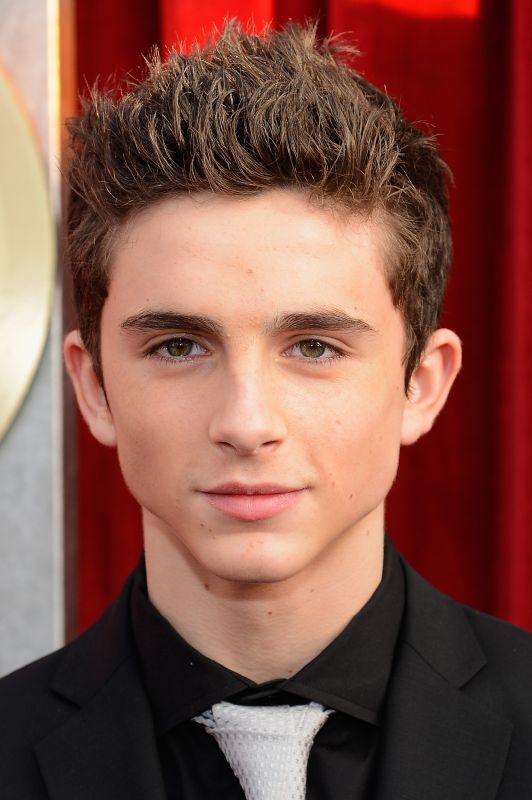
2014 Interstellar LA Premier

2015 Oceana Seachange Party
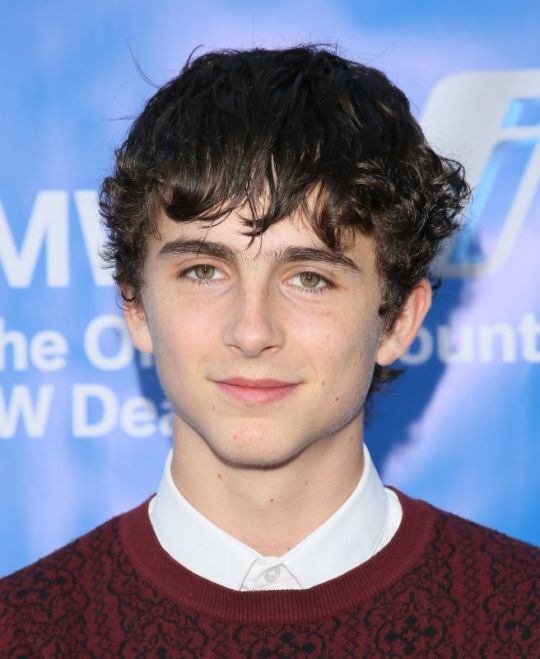
2016 Prodigal Son Premier
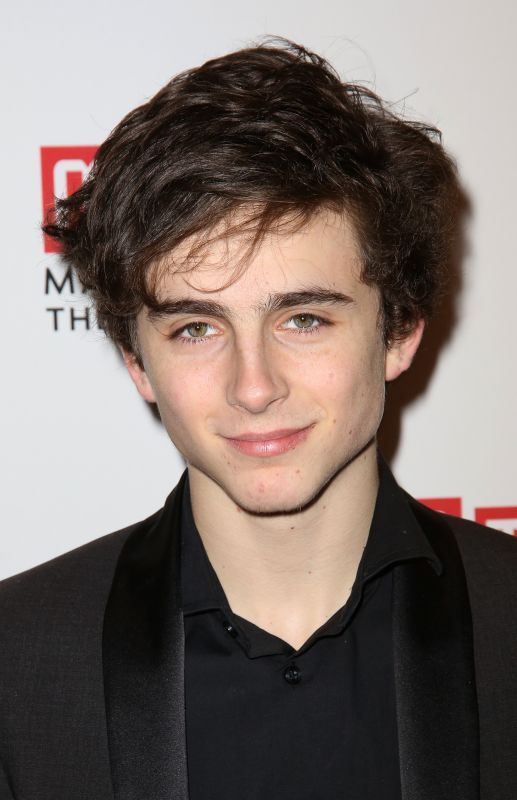
2017 CMBYN Sundance Premier

2018 Critics's Choice Award

2019 Venice King Premier

2020 Oscars

2021 Met Gala

2022 B&A Venice Premier

148 notes
·
View notes
Text

Good morning! I hope you slept well and feel rested? Currently sitting at my desk, in my study, attired only in my blue towelling robe, enjoying my first cuppa of the day. Welcome to Too Much Information Tuesday.
Stephen King's son is called Joe King.
Stressed men prefer big butts. (Stress-free men too!)
Only 28% of people know when they're being flirted with.
Men who vape are more likely to suffer from erectile dysfunction.
The Merchant of Venice is the only Shakespeare play to mention Mexico.
In 2019 there were still 17 US States where it was legal to fire someone for being gay.
The revolving door was invented by a man who hated holding doors open for women.
Cutting people from your life does not mean you hate them, it simply means, you respect yourself.
Not only do mosquitoes bite you and suck your blood, but they also urinate on you before flying off.
The scrotum water frog of Lake Titicaca is on the verge of extinction due to its use as an aphrodisiac.
In March 2014, an Australian Python swallowed a chihuahua and found itself chained to a kennel.
‘Mr. Brightside’ by The Killers was the first 2000s song by a group to surpass one billion streams on Spotify.
According to astronomy, when you wish upon a star, you're actually a few million years late. That star is dead. Just like your dreams.
In 2021, an invisible sculpture was sold for $18,030. Artist Salvatore Garau says his work should, “activate the power of the imagination.”
Charles Darwin thought the menstrual cycle was evidence that early humans lived by the sea and synchronised their lives with the tides.
After King Charles II's wife is said to have caught him picking flowers to give to another woman, there have been no formal flower beds in Green Park since 1660.
In 2017, a Boston man got revenge on his high school bully by sleeping with his mum after he saw her profile on Tinder and hooked up with her for a one night stand.
As we get older, we often feel music used to be so much better because of the 'reminiscence bump', a preference for songs that were popular during our formative years.
Carrie Fisher, who played Princess Leia, and James Earl Jones, who provided the voice for Darth Vader in Star Wars in 1977, met for the first time on a 2014 episode of The Big Bang Theory.
In 1995, a man named Sonny Graham received the transplanted heart of a suicide victim. He then married the donor's wife and later killed himself, in the exact same manner as the donor did.
In 2004, Gary Webb, the California reporter who first broke the story of CIA involvement in the cocaine trade, was found dead with two gunshot wounds to the head. His death was ruled as “suicide”.
Joe Metheny, the infamous serial killer from Baltimore, not only cooked his victims to eat himself, but he also made burgers with their remains and sold them to unsuspecting customers from a roadside food stand.
The marine biologist Joel Hedgpeth was the founder and sole member of the Society for the Prevention of Progress. He rejected all membership applications because “growth in members would represent progress.”
In 1969, Salvador Dalí, the Surrealist painter, gave a derelict castle to his Russian-born wife, Gala, as a present. She welcomed his generosity but also set rules for her new home in Púbol, a village in Catalonia. He could only visit if she sent him written permission.
In 2013, the town of Brunete, Spain instituted a new program to make dog owners pick up after their pooches. They recruited volunteers to watch for anyone leaving poop on the streets, and then mailed it back to the dog's owners.
Eric Idle rang George Harrison when they couldn’t find the money to get ‘The Life Of Brian’ made. George said “Well, when The Beatles were breaking up, Python kept me sane really, so I owe you one.” As a thank you, George was given a cameo as Mr Papadopoulos.
A new drug similar to Viagra can now be sold in pharmacies in the UK without prescription. Cialis, an erectile dysfunction drug will now be sold over the counter in UK pharmacies like Boots, after it was deemed to be safe to take without consulting a doctor or getting a prescription. The pills can last up to 36 hours!!
England is seeing record high levels of gonorrhoea and syphilis sexually transmitted infections, new figures reveal. People are being urged to practice safe sex to protect themselves and get tested if they may be at risk. There were 82,592 cases of gonorrhoea in 2022 - up 50% on the 54,661 recorded the year before, the UK Health Security Agency says. Syphilis cases increased by 15% from 7,543 to 8,692.
Okay, that’s enough information for one day. Have a tremendous and tumultuous Tuesday! I love you all.
#mixcloud#mi soul#dj#music#new blog#lockdown#coronavirus#books#democracy#brexit#cronyism#election#radio#tuesdaymotivation
0 notes
Text
The Italian Gymnastics Federation celebrated its 150th anniversary this year and held a Gala event at the Venice theater La Fenice with performances from the WAG, MAG, RG, and Aerobics national teams. You can watch here (most likely geoblocked so you need a VPN outside of Italy).
It’s highly choreographic, with laser beams, veils, and smoke, with live opera singers and musicians. At the end there is also a moment with former gymnasts who made the history of Italian gym, like Jury Chechi, Igor Cassina, Marta Pagnini, etc.
#venice gala 2019#team italy#vanessa ferrari#desirée carofiglio#alessia federici#martina maggio#giorgia villa#elisa iorio#alice d'amato#asia d'amato#irene lanza#alexandra agiurgiuculese#milena baldassarri#farfalle#alessia russo#RG
4 notes
·
View notes
Text









give credits if you repost, please
like/reblog if you save
follow me for more
Xoxo 💜✨
#timothée chalamet#timothée chalamet icons#call me by your name#elio perlman#little women 2019#Theodore Laurence#lady bird#kyle scheible#the king#Hal#dune#met gala 2021#venice film festival#paul atreides#beautiful boy#nic sheff#a rainy day in new york#gatsby welles#icons#icons sem psd#icons without psd#icon#man icon#man icons#men icon#men icons#male icons#american actor#radom icons#capricorn sign
188 notes
·
View notes
Photo


Kim Kardasian, MET Gala 2019, Thierry Mugler (dress) and Mr. Pearl (corset)
Zendaya, Venice Film Festival 2021, Balmain
39 notes
·
View notes
Photo


sophs-style:
Alessandra Mastronardi and Ni Ni attended the Jaeger-LeCoultre Gala Dinner during the 76th Venice Film Festival on Friday (30th August 2019) in Venice, Italy.
Alessandra wore a long black velvet Etro Fall 2019 dress with puff sleeves. A retro inspired embroidered belt, a box clutch and Jaeger-LeCoultre watch completed the look.
Ni Ni wore a strapless black Alex Perry Fall 2019 gown with a delicate Jaeger-LeCoultre watch.
#Alessandra Mastronardi#etro#NI Ni#Alex Perry#Jaeger-LeCoultre#Jaeger-LeCoultre Gala Dinner#76th Venice Film Festival#76th annual Venice International Film Festival#2019 Venice Film Festival#appearance#event#outfit#outfits#fashion#style#stylish#celebrity#celebrities#celeb style#Actress#red carpet fashion#red carpet style
4 notes
·
View notes
Text
‘My Policeman’ To Receive Toronto International Film Festival’s Tribute Award For Performance

Michael Grandage’s Prime Video movie My Policeman and its ensemble cast will be lauded with the TIFF Tribute Award for Performance at the TIFF Tribute Awards.
The movie, which is making its world premiere at the 47th annual Toronto International Film Festival stars Harry Styles, Emma Corrin, Gina McKee, Linus Roache, David Dawson, and Rupert Everett.
Now in its fourth year, the TIFF Tribute Awards presented by BVLGARI, will return to an in-person gala fundraiser during the 47th edition of the Toronto International Film Festival on Sunday, Sept. 11 at the Fairmont Royal York Hotel.
“When your film shifts through time and across fluid boundaries of love and desire, you need a cast that can embody those nuances in every gesture,” said TIFF CEO Cameron Bailey. “Harry Styles, Emma Corrin and David Dawson deliver beautiful, mirrored performances with Linus Roache, Gina McKee and Rupert Everett. We’re thrilled to honour the ensemble cast of My Policeman with the TIFF Tribute Award for Performance.”
Adapted for the screen by Oscar-nominated screenwriter Ron Nyswaner from Bethan Roberts’ award-winning novel of the same name and directed by Grandage, My Policeman, follows three young people — policeman Tom (Styles), teacher Marion (Corrin), and museum curator Patrick (Dawson) — as they embark on an emotional journey in 1950s Britain. Flashing forward to the 1990s, Tom (Roache), Marion (McKee), and Patrick (Everett) are still reeling with longing and regret, but now they have one last chance to repair the damage of the past.
For the first time ever, the TIFF Tribute Award for Performance will be celebrating an ensemble cast in the now gender-neutral acting category.
Past recipients honored in the acting category were Jessica Chastain and Benedict Cumberbatch in 2021; Kate Winslet and Sir Anthony Hopkins in 2020; and Meryl Streep and Joaquin Phoenix in 2019.
The TIFF Tribute Awards honor the film industry’s outstanding contributors and their achievements, recognizing leading industry members, acting talent, directorial expertise, new talent, and a below-the-line artist and creator. The Awards event also serves as TIFF’s largest annual fundraiser to support TIFF’s Every Story fund, which promotes diversity, equity, inclusion, and belonging in film and TIFF’s core mission to transform the way people see the world through film.
Styles’ separately has the New Line Olivia Wilde directed movie, Don’t Worry Darling, making its world premiere at the Venice Film Festival.
via deadline.com
96 notes
·
View notes
Text
They've been spotted strolling hand-in-hand through the romantic streets of Venice.
And Emma Watson put on a flirty display with Brandon Green, the son of controversial business tycoon Sir Philip, as the pair continued their Italian break on Wednesday.
The actress, 32, and her new beau, 29, enjoyed a day out at contemporary art and culture venue, The Fondazione Prada, in the city.
Emma nailed summer chic in a stunning blue floral midi dress that featured a sweetheart neckline and low back.
Brandon opted for a bright pink T-shirt and black trousers with a large padded backpack.
The couple chatted outside the steps of the venue before hopping into one of the cities many taxi boats.
Emma and Brandon were first pictured together last September when they disembarked from a helicopter in Battersea, London.
It was previously revealed by The Daily Mail that Brandon has entirely different career aspirations than his father, instead sharing Emma's interest in the environment.
A source said that he became invested in saving the planet after his father's Arcadia Group empire – which included Topshop, Dorothy Perkins and Burton – crumbled.
They confirmed: 'He got very interested in biodiversity and saving the oceans. He does a lot of charity work with both Monaco's Prince Albert’s foundation and Princess Charlene's foundation.
'He is very into fitness and gets involved with galas and charities that help the planet. He does frequent beach clean-ups and whatever he can to help.'
Meanwhile, Sir Philip is known for his lavish lifestyle, which includes polluting superyachts and private jets.
The tycoon, who is worth £910million according to The Sunday Times Rich List, and his wife Tina are believed to have owned a number of yachts. The largest, a 90-metre superyacht called the Lionheart, is worth more than £100million.
Their relationship comes after Emma's split from businessman Leo Robinton, who shares a striking resemblance to her new beau.
The Harry Potter star dated Californian business owner Leo from August 2019 until their split two years ago.
---
I was wondering why she never wore the blue Reformation dress (which we saw her wear when she was spotted with Brandon) for a pap walk when she wore the red one and BOOM. Another Backgrid shoot where she's wearing it. She's definitely promoting the dresses.
2 notes
·
View notes
Note
When will Dune be scheduled in Venice?It will be even crazier than 2019 for Timmy. Can't wait to see that red carpet.
Venice runs from September 1-11 and the Met Gala is September 13, so I would assume Dune will show during the early days. He's used to this kind of crazy schedule and has had a huge break so I'm sure he is more than hyped to tackle whatever needs to be done.
9 notes
·
View notes
Note
Please, if people judge, I'm going to need everyone to judge the big celebrities that have been out in NYC, LA, Venice, etc partying like we in 2019. To each their own and may everyone stay as safe as you can. Let the girl live and move on. She didnt rub it in no one's face and everyone so far has been respectful not to post.
Yeah, and truthfully I don't see that big of a difference between a party and flying across the world to go to the Venice Film Fest. I know one is for work but out is out. Or attending red carpet events, which people are doing. Or the Met Gala. I'm not saying I think it's particularly responsible to have a big party right now but I don't know that I think it’s that different than all the red carpet stuff people are ignoring and seem to be fine with--see all the celebs hanging out at various events and fests. Or like if you are mad about the party, then why aren’t you mad that she went to a wedding the week before? Be consistent.
1 note
·
View note
Text
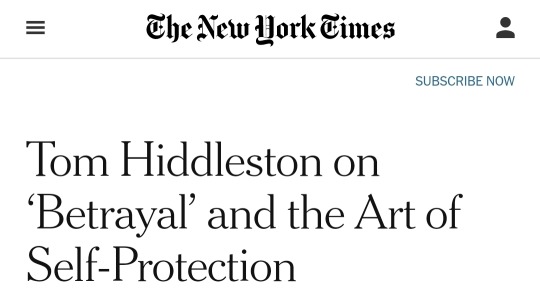
The screen and stage star is making his Broadway debut as the bottled-up husband wearing a “mask of control” in Harold Pinter’s romantic triangle.

[ By Laura Collins-Hughes
Aug. 21, 2019, 5:00 a.m. ET ]
Tom Hiddleston was posing for a portrait, and the face he showed the camera wasn’t entirely his own.
That had been his idea, to slip for a few moments into the character he’s playing on Broadway, in Harold Pinter’s “Betrayal”: Robert, the cheated-on husband and backstabbed best friend whose coolly proper facade is the carapace containing a crumbling man. And when Mr. Hiddleston became him, the change was instantaneous: the guarded stillness of his body, the chill reserve in his gray-blue eyes.
“It’s interesting,” Mr. Hiddleston said after a while, analyzing Robert’s expression from the inside. “It gives less away.” A pause, and then his own smile flickered back, its pleasure undisguised. “O.K.,” Mr. Hiddleston announced, himself again, “it’s not Robert anymore.”
It was late on a muggy August morning, one day before the show’s first preview at the Bernard B. Jacobs Theater, and Mr. Hiddleston — the classically trained British actor best known for playing the winsomely chaotic villain Loki, god of mischief and brother of Thor, in the Marvel film franchise — had been in New York for less than a week.
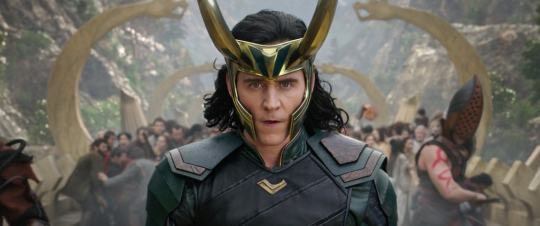
He’ll be here all autumn for the limited run of the production, a hit in London earlier this year, but he wasn’t going to pretend that he’d settled in. “I literally have never sat in this room before,” he’d said at the top of the photo shoot, in his cramped auxiliary dressing room, next door to the similarly tiny one he had been occupying.
He’d had nothing to do with the space’s camera-ready décor. So there was no use making a metaphor of the handsome clock with its hands stopped at 12 (“Betrayal” is famous for its reverse chronology; far more apt if the clock had run backward), or of the compact stack of pristine books that looked like journals, with pretty covers and presumably empty pages: a bit off-brand for Mr. Hiddleston, who at 38 has a model-perfect exterior with quite a lot inscribed inside.
Take the matter-of-fact way he said, in explaining that he’d first encountered Pinter’s work when he studied for his A-levels in English literature, theater, Latin and Greek: “It was a real tossup between French and Spanish or Latin and Greek. I thought, I can always speak French and Spanish, I can’t always read Latin and Greek, so I’ll study that and I’ll speak the other two.”
Though, to be fair, he only said that because I’d teased him slightly about the Latin and Greek, and I’d teased him — not a recommended journalistic technique — because he was so disarmingly good-humored and resolutely down to earth, chatting away as he waited for the photographer to set up a shot. It didn’t seem like it would ruffle him. He laughed, actually.
From a one-night reading to Broadway

In this country, Mr. Hiddleston is mainly a screen star, known also for playing Jonathan Pine in the John le Carré series “The Night Manager” on AMC. There are plans, too, for him to bring Loki to Disney’s streaming service in a stand-alone series.
But at home in London, he has amassed some impressive Shakespearean credits, including the title roles in Kenneth Branagh’s “Hamlet” and Josie Rourke’s “Coriolanus,” and a turn as Cassio in Michael Grandage’s “Othello” — a production that Pinter, saw some months before he died in 2008. That was the year Mr. Hiddleston won a best newcomer Olivier Award for Cheek by Jowl’s “Cymbeline.”
Jamie Lloyd’s “Betrayal,” which has a staging to match the spareness of Pinter’s language and a roiling well of squelched emotion to feed its comedy, is Mr. Hiddleston’s Broadway debut. Likewise for his co-stars, Zawe Ashton (of Netflix’s “Velvet Buzzsaw”), who plays Emma, Robert’s wife; and Charlie Cox (of Netflix’s “Daredevil”), who plays Emma’s lover, Jerry, Robert’s oldest friend.
Beginning at what appears to be the end of Robert and Emma’s marriage, after her yearslong affair with Jerry has sputtered to a stop, it’s a drama of cascading double-crosses. First staged by Peter Hall in London in 1978 — and in 1980 on Broadway, where it starred Roy Scheider, Blythe Danner and Raul Julia — it rewinds through time to the sozzled evening when Emma and Jerry overstep the line.
The most recent Broadway revival was just six years ago, directed by Mike Nichols and starring Daniel Craig as Robert, Rachel Weisz as Emma and Rafe Spall as Jerry. It might seem too soon for another, let alone one with sexiness to spare — except that Mr. Lloyd’s production is also marked by a palpable hauntedness and a profound sense of loss.
Reviewing the London staging in The New York Times, Matt Wolf called it “a benchmark achievement for everyone involved,” showing the play “in a revealing, even radical, new light.” Michael Billington, in The Guardian, called Mr. Hiddleston’s performance “superb.”
What’s curious is that Mr. Hiddleston, so good at bad boys, isn’t playing Jerry, the more glamorous role: the cad, the pursuer, the best man who goes after the bride. But Mr. Lloyd said that casting him that way was never part of their discussions.
Last fall, when Mr. Lloyd persuaded Mr. Hiddleston to read a scene with Ms. Ashton for a one-night gala celebration of Pinter in London, part of the season-long Pinter at the Pinter series, there was no grand plan. Having asked Mr. Hiddleston about a possible collaboration for years, since “just before he became ridiculously famous,” Mr. Lloyd said, this was the first time he got a yes.
“I just really admired his craft of acting, the precision of his acting, as well as his real emotional depth and his real wit,” Mr. Lloyd said. “And he’s turned into what I think is the epitome of a great Pinter actor. Because if you’re in a Pinter play, you have to dig really deep and connect to terrible loss or excruciating pain, often massive volcanic emotion, and then you have to bottle it all up. You have to suppress it all.”
This, he added, is what Mr. Hiddleston does in “Betrayal,” where characters’ meaning is found between and behind the words, not inside them.
“Some of the pain that he’s created in Robert, it’s just unbearable, and yet he always keeps a lid on it,” Mr. Lloyd said.
The scene Mr. Hiddleston and Ms. Ashton read at the gala appears at the midpoint of “Betrayal”: Robert and Emma on vacation in Venice, at a moment that leaves their marriage with permanent damage. Within days, Mr. Hiddleston told Mr. Lloyd that he was on board for a full production.

‘What remains private’
Photos taken, back in the faintly more lived-in of his Broadway dressing rooms, Mr. Hiddleston opened the window to let in some Midtown air — and when you’re as tall as he is, 6 feet 2 inches, opening it from the top of the window frame is easy enough to do. Then, making himself an espresso with his countertop machine, he sat down to talk at length.
“I’m always curious about the presentation of a character’s external persona versus the interior,“ he said. “What remains private, hidden, concealed, protected, and what does the character allow to be seen? We all have a very complex internal world, and not all of that is on display in our external reality.”
He can tick off the ways that various characters of his conceal what’s inside: Loki, with all that rage and vulnerability “tucked away”; the ultra-proper spy Jonathan Pine, in “The Night Manager,” “hiding behind his politeness”; Robert, a lonely man wearing “a mask of control” that renders him “confident, powerful, polished,” at least as far as any onlookers can tell.
In “Betrayal,” each of the three principals has an enormous amount to hide from the people who are meant to be their closest intimates. It’s a play about power and manipulation, duplicity and misplaced trust, and what’s so threatening about it is the very ordinariness of its privileged milieu. This snug little world that once seemed so safe and ideal — the happiest of families, the oldest of friends — has long since fallen apart.
But to Mr. Hiddleston, Pinter’s drama contains two themes just as significant as betrayal: isolation and loneliness.
“The sadness in the play — it’s not only sadness; because it’s Pinter, there’s wit and levity as well — but if there is sadness in the play,” he said, “I think it comes from the fact that these betrayals render Robert, Emma and Jerry more alone than they were before.”
Trust and self-protection
One-on-one, Mr. Hiddleston was more cautious than he’d been during the photo shoot, surrounded then by a gaggle of people affiliated with the show. Still, when I asked him about betrayal, lowercase, he went straight to the condition it violates.
“To trust is a profound commitment, and to trust is to make oneself vulnerable,” he said, fidgeting with a red rubber band and choosing his words with care. “It’s such an optimistic act, because you’re putting your faith in the hands of someone or something which you expect to remain constant, even if the circumstances change.”
“I’m disappearing down a rabbit hole here,” he said, “but I think about it a lot. I think about certainty and uncertainty. Trust is a way of managing uncertainty. It’s a way of finding security in saying, ‘Perhaps all of this is uncertain, but I trust you.’ Or, ‘I trust this.’ And there’s a lot of uncertainty in the world at the moment, so it becomes harder to trust, I suppose.”
An interview itself is an act of trust, albeit often a wary one. And there was one stipulated no-go zone in this encounter, a condition mentioned by a publicist only after I’d arrived: No talk of Taylor Swift, with whom Mr. Hiddleston had a brief, intense, headline-generating romance that, post-breakup, she evidently spun into song lyrics.
That was three years ago, and I hadn’t been planning to bring her up; given the context of the play, though, make of that prohibition what you will. Mr. Hiddleston, who once had a tendency to pour his heart out to reporters, knows that he can’t stop you.
“It’s not possible, and nor should it be possible, to control what anyone thinks about you,” he said. “Especially if it’s not based in any, um —” he gave a soft, joyless laugh — “if it’s not based in any reality.”

That’s something he’s learned about navigating fame — about being put on a pedestal that’s then kicked out from under him. He knows now “to let go of the energy that comes toward me, be it good or bad,” he said. “Because naturally in the early days I took responsibility for it.”
“And yes, I’m protective about my internal world now in probably a different way,” he added, his tone as restrained as his words. He took a beat, and so much went unsaid in what he said next: “That’s because I didn’t realize it needed protecting before.”
Even so, he doesn’t give the impression of having closed himself off. When something genuinely made him laugh, he smiled a smile that cracked his face wide open.
And the way he treated the people around him at work — with a fundamental respect, regardless of rank, and no whiff of flattery — made him seem sincere about what he called “staying true to the part of myself that’s quite simple, that’s quite ordinary.”
That investment in his ordinariness, as he put it, is a hedge against the destabilizing trappings of fame, but it doubles as a way of protecting his craft.
It’s also of a piece with his insistence that vulnerability is a necessary risk to take, at least sometimes.
“If you go through life without connecting to people,” he asked, “how much could you call that a life?”
#tom hiddleston#hiddles#twhiddleston#the new york times#Betrayal#harold pinter play#Betrayal Broadway#bernard b jacobs theater#August 21 2019#Devin Yalkin#tom hiddleston interview#loki#tom hiddleston portrait#black and white photography#new york city#link to original article in source
701 notes
·
View notes
Link
Tom Hiddleston was posing for a portrait, and the face he showed the camera wasn’t entirely his own.
That had been his idea, to slip for a few moments into the character he’s playing on Broadway, in Harold Pinter’s “Betrayal”: Robert, the cheated-on husband and backstabbed best friend whose coolly proper facade is the carapace containing a crumbling man. And when Mr. Hiddleston became him, the change was instantaneous: the guarded stillness of his body, the chill reserve in his gray-blue eyes.
“It’s interesting,” Mr. Hiddleston said after a while, analyzing Robert’s expression from the inside. “It gives less away.” A pause, and then his own smile flickered back, its pleasure undisguised. “O.K.,” Mr. Hiddleston announced, himself again, “it’s not Robert anymore.”
It was late on a muggy August morning, one day before the show’s first preview at the Bernard B. Jacobs Theater, and Mr. Hiddleston — the classically trained British actor best known for playing the winsomely chaotic villain Loki, god of mischief and brother of Thor, in the Marvel film franchise — had been in New York for less than a week.

He’ll be here all autumn for the limited run of the production, a hit in London earlier this year, but he wasn’t going to pretend that he’d settled in. “I literally have never sat in this room before,” he’d said at the top of the photo shoot, in his cramped auxiliary dressing room, next door to the similarly tiny one he had been occupying.
He’d had nothing to do with the space’s camera-ready décor. So there was no use making a metaphor of the handsome clock with its hands stopped at 12 (“Betrayal” is famous for its reverse chronology; far more apt if the clock had run backward), or of the compact stack of pristine books that looked like journals, with pretty covers and presumably empty pages: a bit off-brand for Mr. Hiddleston, who at 38 has a model-perfect exterior with quite a lot inscribed inside.
Take the matter-of-fact way he said, in explaining that he’d first encountered Pinter’s work when he studied for his A-levels in English literature, theater, Latin and Greek: “It was a real tossup between French and Spanish or Latin and Greek. I thought, I can always speak French and Spanish, I can’t always read Latin and Greek, so I’ll study that and I’ll speak the other two.”
Though, to be fair, he only said that because I’d teased him slightly about the Latin and Greek, and I’d teased him — not a recommended journalistic technique — because he was so disarmingly good-humored and resolutely down to earth, chatting away as he waited for the photographer to set up a shot. It didn’t seem like it would ruffle him. He laughed, actually.
From a one-night reading to Broadway

In this country, Mr. Hiddleston is mainly a screen star, known also for playing Jonathan Pine in the John le Carré series “The Night Manager” on AMC. There are plans, too, for him to bring Loki to Disney’s streaming service in a stand-alone series.
But at home in London, he has amassed some impressive Shakespearean credits, including the title roles in Kenneth Branagh’s “Hamlet” and Josie Rourke’s “Coriolanus,” and a turn as Cassio in Michael Grandage’s “Othello” — a production that Pinter, saw some months before he died in 2008. That was the year Mr. Hiddleston won a best newcomer Olivier Award for Cheek by Jowl’s “Cymbeline.”
Jamie Lloyd’s “Betrayal,” which has a staging to match the spareness of Pinter’s language and a roiling well of squelched emotion to feed its comedy, is Mr. Hiddleston’s Broadway debut. Likewise for his co-stars, Zawe Ashton (of Netflix’s “Velvet Buzzsaw”), who plays Emma, Robert’s wife; and Charlie Cox (of Netflix’s “Daredevil”), who plays Emma’s lover, Jerry, Robert’s oldest friend.
Beginning at what appears to be the end of Robert and Emma’s marriage, after her yearslong affair with Jerry has sputtered to a stop, it’s a drama of cascading double-crosses. First staged by Peter Hall in London in 1978 — and in 1980 on Broadway, where it starred Roy Scheider, Blythe Danner and Raul Julia — it rewinds through time to the sozzled evening when Emma and Jerry overstep the line.
The most recent Broadway revival was just six years ago, directed by Mike Nichols and starring Daniel Craig as Robert, Rachel Weisz as Emma and Rafe Spall as Jerry. It might seem too soon for another, let alone one with sexiness to spare — except that Mr. Lloyd’s production is also marked by a palpable hauntedness and a profound sense of loss.
Reviewing the London staging in The New York Times, Matt Wolf called it “a benchmark achievement for everyone involved,” showing the play “in a revealing, even radical, new light.” Michael Billington, in The Guardian, called Mr. Hiddleston’s performance “superb.”
What’s curious is that Mr. Hiddleston, so good at bad boys, isn’t playing Jerry, the more glamorous role: the cad, the pursuer, the best man who goes after the bride. But Mr. Lloyd said that casting him that way was never part of their discussions.
Last fall, when Mr. Lloyd persuaded Mr. Hiddleston to read a scene with Ms. Ashton for a one-night gala celebration of Pinter in London, part of the season-long Pinter at the Pinter series, there was no grand plan. Having asked Mr. Hiddleston about a possible collaboration for years, since “just before he became ridiculously famous,” Mr. Lloyd said, this was the first time he got a yes.
“I just really admired his craft of acting, the precision of his acting, as well as his real emotional depth and his real wit,” Mr. Lloyd said. “And he’s turned into what I think is the epitome of a great Pinter actor. Because if you’re in a Pinter play, you have to dig really deep and connect to terrible loss or excruciating pain, often massive volcanic emotion, and then you have to bottle it all up. You have to suppress it all.”
This, he added, is what Mr. Hiddleston does in “Betrayal,” where characters’ meaning is found between and behind the words, not inside them.
“Some of the pain that he’s created in Robert, it’s just unbearable, and yet he always keeps a lid on it,” Mr. Lloyd said.
The scene Mr. Hiddleston and Ms. Ashton read at the gala appears at the midpoint of “Betrayal”: Robert and Emma on vacation in Venice, at a moment that leaves their marriage with permanent damage. Within days, Mr. Hiddleston told Mr. Lloyd that he was on board for a full production.
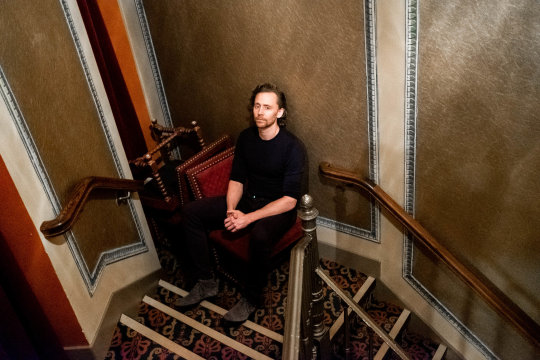
‘What remains private’
Photos taken, back in the faintly more lived-in of his Broadway dressing rooms, Mr. Hiddleston opened the window to let in some Midtown air — and when you’re as tall as he is, 6 feet 2 inches, opening it from the top of the window frame is easy enough to do. Then, making himself an espresso with his countertop machine, he sat down to talk at length.
“I’m always curious about the presentation of a character’s external persona versus the interior,“ he said. “What remains private, hidden, concealed, protected, and what does the character allow to be seen? We all have a very complex internal world, and not all of that is on display in our external reality.”
He can tick off the ways that various characters of his conceal what’s inside: Loki, with all that rage and vulnerability “tucked away”; the ultra-proper spy Jonathan Pine, in “The Night Manager,” “hiding behind his politeness”; Robert, a lonely man wearing “a mask of control” that renders him “confident, powerful, polished,” at least as far as any onlookers can tell.
In “Betrayal,” each of the three principals has an enormous amount to hide from the people who are meant to be their closest intimates. It’s a play about power and manipulation, duplicity and misplaced trust, and what’s so threatening about it is the very ordinariness of its privileged milieu. This snug little world that once seemed so safe and ideal — the happiest of families, the oldest of friends — has long since fallen apart.
But to Mr. Hiddleston, Pinter’s drama contains two themes just as significant as betrayal: isolation and loneliness.
“The sadness in the play — it’s not only sadness; because it’s Pinter, there’s wit and levity as well — but if there is sadness in the play,” he said, “I think it comes from the fact that these betrayals render Robert, Emma and Jerry more alone than they were before.”
Trust and self-protection
One-on-one, Mr. Hiddleston was more cautious than he’d been during the photo shoot, surrounded then by a gaggle of people affiliated with the show. Still, when I asked him about betrayal, lowercase, he went straight to the condition it violates.
“To trust is a profound commitment, and to trust is to make oneself vulnerable,” he said, fidgeting with a red rubber band and choosing his words with care. “It’s such an optimistic act, because you’re putting your faith in the hands of someone or something which you expect to remain constant, even if the circumstances change.”
“I’m disappearing down a rabbit hole here,” he said, “but I think about it a lot. I think about certainty and uncertainty. Trust is a way of managing uncertainty. It’s a way of finding security in saying, ‘Perhaps all of this is uncertain, but I trust you.’ Or, ‘I trust this.’ And there’s a lot of uncertainty in the world at the moment, so it becomes harder to trust, I suppose.”
An interview itself is an act of trust, albeit often a wary one. And there was one stipulated no-go zone in this encounter, a condition mentioned by a publicist only after I’d arrived: No talk of Taylor Swift, with whom Mr. Hiddleston had a brief, intense, headline-generating romance that, post-breakup, she evidently spun into song lyrics.
That was three years ago, and I hadn’t been planning to bring her up; given the context of the play, though, make of that prohibition what you will. Mr. Hiddleston, who once had a tendency to pour his heart out to reporters, knows that he can’t stop you.
“It’s not possible, and nor should it be possible, to control what anyone thinks about you,” he said. “Especially if it’s not based in any, um —” he gave a soft, joyless laugh — “if it’s not based in any reality.”

That’s something he’s learned about navigating fame — about being put on a pedestal that’s then kicked out from under him. He knows now “to let go of the energy that comes toward me, be it good or bad,” he said. “Because naturally in the early days I took responsibility for it.”
“And yes, I’m protective about my internal world now in probably a different way,” he added, his tone as restrained as his words. He took a beat, and so much went unsaid in what he said next: “That’s because I didn’t realize it needed protecting before.”
Even so, he doesn’t give the impression of having closed himself off. When something genuinely made him laugh, he smiled a smile that cracked his face wide open.
And the way he treated the people around him at work — with a fundamental respect, regardless of rank, and no whiff of flattery — made him seem sincere about what he called “staying true to the part of myself that’s quite simple, that’s quite ordinary.”
That investment in his ordinariness, as he put it, is a hedge against the destabilizing trappings of fame, but it doubles as a way of protecting his craft.
It’s also of a piece with his insistence that vulnerability is a necessary risk to take, at least sometimes.
“If you go through life without connecting to people,” he asked, “how much could you call that a life?”
116 notes
·
View notes
Link
Tom Hiddleston was posing for a portrait, and the face he showed the camera wasn’t entirely his own.
That had been his idea, to slip for a few moments into the character he’s playing on Broadway, in Harold Pinter’s “Betrayal”: Robert, the cheated-on husband and backstabbed best friend whose coolly proper facade is the carapace containing a crumbling man. And when Mr. Hiddleston became him, the change was instantaneous: the guarded stillness of his body, the chill reserve in his gray-blue eyes.
“It’s interesting,” Mr. Hiddleston said after a while, analyzing Robert’s expression from the inside. “It gives less away.” A pause, and then his own smile flickered back, its pleasure undisguised. “O.K.,” Mr. Hiddleston announced, himself again, “it’s not Robert anymore.”
It was late on a muggy August morning, one day before the show’s first preview at the Bernard B. Jacobs Theater, and Mr. Hiddleston — the classically trained British actor best known for playing the winsomely chaotic villain Loki, god of mischief and brother of Thor, in the Marvel film franchise — had been in New York for less than a week.

He’ll be here all autumn for the limited run of the production, a hit in London earlier this year, but he wasn’t going to pretend that he’d settled in. “I literally have never sat in this room before,” he’d said at the top of the photo shoot, in his cramped auxiliary dressing room, next door to the similarly tiny one he had been occupying.
He’d had nothing to do with the space’s camera-ready décor. So there was no use making a metaphor of the handsome clock with its hands stopped at 12 (“Betrayal” is famous for its reverse chronology; far more apt if the clock had run backward), or of the compact stack of pristine books that looked like journals, with pretty covers and presumably empty pages: a bit off-brand for Mr. Hiddleston, who at 38 has a model-perfect exterior with quite a lot inscribed inside.
Take the matter-of-fact way he said, in explaining that he’d first encountered Pinter’s work when he studied for his A-levels in English literature, theater, Latin and Greek: “It was a real tossup between French and Spanish or Latin and Greek. I thought, I can always speak French and Spanish, I can’t always read Latin and Greek, so I’ll study that and I’ll speak the other two.”
Though, to be fair, he only said that because I’d teased him slightly about the Latin and Greek, and I’d teased him — not a recommended journalistic technique — because he was so disarmingly good-humored and resolutely down to earth, chatting away as he waited for the photographer to set up a shot. It didn’t seem like it would ruffle him. He laughed, actually.
From a one-night reading to Broadway

In this country, Mr. Hiddleston is mainly a screen star, known also for playing Jonathan Pine in the John le Carré series “The Night Manager” on AMC. There are plans, too, for him to bring Loki to Disney’s streaming service in a stand-alone series.
But at home in London, he has amassed some impressive Shakespearean credits, including the title roles in Kenneth Branagh’s “Hamlet” and Josie Rourke’s “Coriolanus,” and a turn as Cassio in Michael Grandage’s “Othello” — a production that Pinter, saw some months before he died in 2008. That was the year Mr. Hiddleston won a best newcomer Olivier Award for Cheek by Jowl’s “Cymbeline.”
Jamie Lloyd’s “Betrayal,” which has a staging to match the spareness of Pinter’s language and a roiling well of squelched emotion to feed its comedy, is Mr. Hiddleston’s Broadway debut. Likewise for his co-stars, Zawe Ashton (of Netflix’s “Velvet Buzzsaw”), who plays Emma, Robert’s wife; and Charlie Cox (of Netflix’s “Daredevil”), who plays Emma’s lover, Jerry, Robert’s oldest friend.
Beginning at what appears to be the end of Robert and Emma’s marriage, after her yearslong affair with Jerry has sputtered to a stop, it’s a drama of cascading double-crosses. First staged by Peter Hall in London in 1978 — and in 1980 on Broadway, where it starred Roy Scheider, Blythe Danner and Raul Julia — it rewinds through time to the sozzled evening when Emma and Jerry overstep the line.
The most recent Broadway revival was just six years ago, directed by Mike Nichols and starring Daniel Craig as Robert, Rachel Weisz as Emma and Rafe Spall as Jerry. It might seem too soon for another, let alone one with sexiness to spare — except that Mr. Lloyd’s production is also marked by a palpable hauntedness and a profound sense of loss.
Reviewing the London staging in The New York Times, Matt Wolf called it “a benchmark achievement for everyone involved,” showing the play “in a revealing, even radical, new light.” Michael Billington, in The Guardian, called Mr. Hiddleston’s performance “superb.”
What’s curious is that Mr. Hiddleston, so good at bad boys, isn’t playing Jerry, the more glamorous role: the cad, the pursuer, the best man who goes after the bride. But Mr. Lloyd said that casting him that way was never part of their discussions.
Last fall, when Mr. Lloyd persuaded Mr. Hiddleston to read a scene with Ms. Ashton for a one-night gala celebration of Pinter in London, part of the season-long Pinter at the Pinter series, there was no grand plan. Having asked Mr. Hiddleston about a possible collaboration for years, since “just before he became ridiculously famous,” Mr. Lloyd said, this was the first time he got a yes.
“I just really admired his craft of acting, the precision of his acting, as well as his real emotional depth and his real wit,” Mr. Lloyd said. “And he’s turned into what I think is the epitome of a great Pinter actor. Because if you’re in a Pinter play, you have to dig really deep and connect to terrible loss or excruciating pain, often massive volcanic emotion, and then you have to bottle it all up. You have to suppress it all.”
This, he added, is what Mr. Hiddleston does in “Betrayal,” where characters’ meaning is found between and behind the words, not inside them.
“Some of the pain that he’s created in Robert, it’s just unbearable, and yet he always keeps a lid on it,” Mr. Lloyd said.
The scene Mr. Hiddleston and Ms. Ashton read at the gala appears at the midpoint of “Betrayal”: Robert and Emma on vacation in Venice, at a moment that leaves their marriage with permanent damage. Within days, Mr. Hiddleston told Mr. Lloyd that he was on board for a full production.
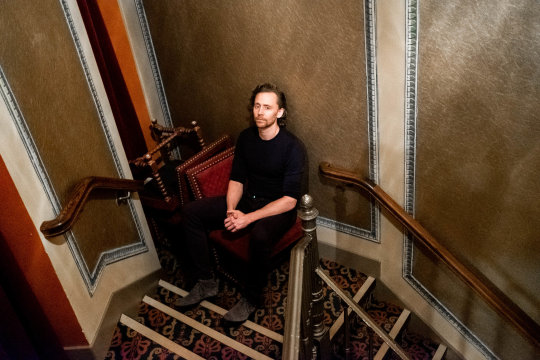
‘What remains private’
Photos taken, back in the faintly more lived-in of his Broadway dressing rooms, Mr. Hiddleston opened the window to let in some Midtown air — and when you’re as tall as he is, 6 feet 2 inches, opening it from the top of the window frame is easy enough to do. Then, making himself an espresso with his countertop machine, he sat down to talk at length.
“I’m always curious about the presentation of a character’s external persona versus the interior,“ he said. “What remains private, hidden, concealed, protected, and what does the character allow to be seen? We all have a very complex internal world, and not all of that is on display in our external reality.”
He can tick off the ways that various characters of his conceal what’s inside: Loki, with all that rage and vulnerability “tucked away”; the ultra-proper spy Jonathan Pine, in “The Night Manager,” “hiding behind his politeness”; Robert, a lonely man wearing “a mask of control” that renders him “confident, powerful, polished,” at least as far as any onlookers can tell.
In “Betrayal,” each of the three principals has an enormous amount to hide from the people who are meant to be their closest intimates. It’s a play about power and manipulation, duplicity and misplaced trust, and what’s so threatening about it is the very ordinariness of its privileged milieu. This snug little world that once seemed so safe and ideal — the happiest of families, the oldest of friends — has long since fallen apart.
But to Mr. Hiddleston, Pinter’s drama contains two themes just as significant as betrayal: isolation and loneliness.
“The sadness in the play — it’s not only sadness; because it’s Pinter, there’s wit and levity as well — but if there is sadness in the play,” he said, “I think it comes from the fact that these betrayals render Robert, Emma and Jerry more alone than they were before.”
Trust and self-protection
One-on-one, Mr. Hiddleston was more cautious than he’d been during the photo shoot, surrounded then by a gaggle of people affiliated with the show. Still, when I asked him about betrayal, lowercase, he went straight to the condition it violates.
“To trust is a profound commitment, and to trust is to make oneself vulnerable,” he said, fidgeting with a red rubber band and choosing his words with care. “It’s such an optimistic act, because you’re putting your faith in the hands of someone or something which you expect to remain constant, even if the circumstances change.”
“I’m disappearing down a rabbit hole here,” he said, “but I think about it a lot. I think about certainty and uncertainty. Trust is a way of managing uncertainty. It’s a way of finding security in saying, ‘Perhaps all of this is uncertain, but I trust you.’ Or, ‘I trust this.’ And there’s a lot of uncertainty in the world at the moment, so it becomes harder to trust, I suppose.”
An interview itself is an act of trust, albeit often a wary one. And there was one stipulated no-go zone in this encounter, a condition mentioned by a publicist only after I’d arrived: No talk of Taylor Swift, with whom Mr. Hiddleston had a brief, intense, headline-generating romance that, post-breakup, she evidently spun into song lyrics.
That was three years ago, and I hadn’t been planning to bring her up; given the context of the play, though, make of that prohibition what you will. Mr. Hiddleston, who once had a tendency to pour his heart out to reporters, knows that he can’t stop you.
“It’s not possible, and nor should it be possible, to control what anyone thinks about you,” he said. “Especially if it’s not based in any, um —” he gave a soft, joyless laugh — “if it’s not based in any reality.”
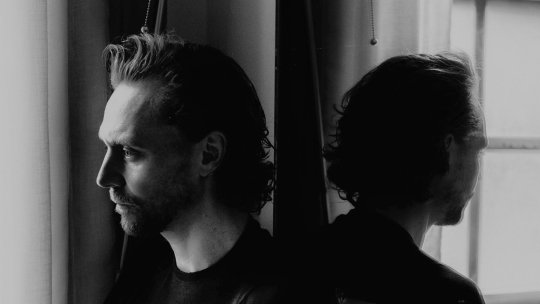
That’s something he’s learned about navigating fame — about being put on a pedestal that’s then kicked out from under him. He knows now “to let go of the energy that comes toward me, be it good or bad,” he said. “Because naturally in the early days I took responsibility for it.”
“And yes, I’m protective about my internal world now in probably a different way,” he added, his tone as restrained as his words. He took a beat, and so much went unsaid in what he said next: “That’s because I didn’t realize it needed protecting before.”
Even so, he doesn’t give the impression of having closed himself off. When something genuinely made him laugh, he smiled a smile that cracked his face wide open.
And the way he treated the people around him at work — with a fundamental respect, regardless of rank, and no whiff of flattery — made him seem sincere about what he called “staying true to the part of myself that’s quite simple, that’s quite ordinary.”
That investment in his ordinariness, as he put it, is a hedge against the destabilizing trappings of fame, but it doubles as a way of protecting his craft.
It’s also of a piece with his insistence that vulnerability is a necessary risk to take, at least sometimes.
“If you go through life without connecting to people,” he asked, “how much could you call that a life?”
#tom hiddleston#betrayal#betrayal broadway#harold pinter#bernard b jacobs theatre#theatre#broadway#jamie lloyd#zawe ashton#charlie cox#the new york times
111 notes
·
View notes
Text
In Two Minds: the polymorphous proficiency of Jonathan Miller
Sir Jonathan Miller was precocious polymath. Pretty much all the tributes to Jonathan Miller, who died aged 85 on 27 November 2019, end up using the term “Renaissance Man” at some point. Miller had a mastery of arts and science that few achieve. He was a doctor who specialised in neurology, a satirist, comedian, television broadcaster and writer, and theatre and opera director in which his transformative productions of classic plays and operas made him one of the most admired, as well as one of the most controversial, figures in the late-twentieth century theatre and opera.
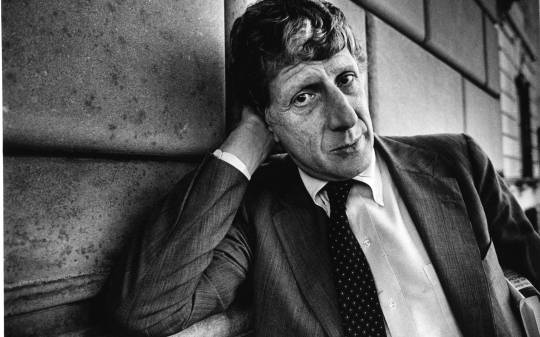
Jonathan Wolfe Miller was born in 1934 in London. His father, Emanuel, was a child psychiatrist and his mother, Betty, a novelist and biographer. He had a sister, Sarah, who died in 2006. He attended St Paul’s, an independent day school, where he formed an intellectually precocious triumvirate with Oliver Sacks, later renowned as a neurologist and author, and Eric Korn, the writer and antiquarian bookseller. The three remained firm friends until Korn died in 2014 (Sacks died a year later). At Cambridge, Miller was a member of the Apostles, an exclusive intellectual club, as well as Footlights, the dramatic society.
Miller studied medicine at Cambridge University where he was a member of the Apostles, an exclusive invitation only intellectual club (past members included Bertrand Russell, Wittgenstein, John Maynard Keynes, Rupert Brooke, E.M. Forster, as well as more notoriously the infamous Cambridge spies, Anthony Blunt and Guy Burgess).
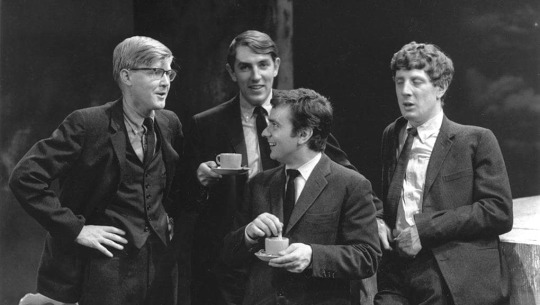
It was at Cambridge that he also joined the Cambridge Footlights, the university’s legendary theatrical comedy club, and performed in the club’s Footlights revues. Miller’s success as a Footlights star in the 1950s brought him to the attention of the producers of a new comedy stage revue, Beyond the Fringe, which opened in Edinburgh in August 1960. Subsequent transfers to London’s West End (1961) and to Broadway (1962) made Miller and his three Oxbridge educated co-stars - Alan Bennett, Peter Cook and Dudley Moore - instant celebrities.
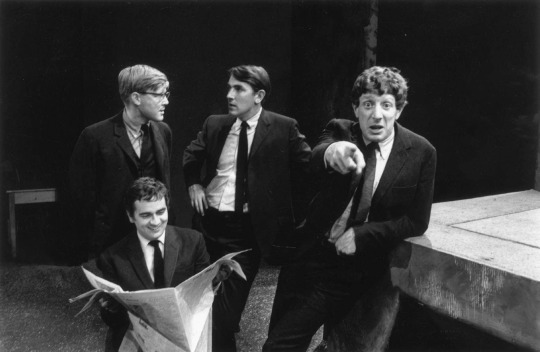
Beyond the Fringe was in the vanguard of a new generation chipping at the walls of the establishment and poking fun at the rigid pomposity of british class and society in the 1960s. In many ways Beyond the Fringe pioneered a path for the next generation of Oxbridge satirists, Monty Python, to take up the baton and beat it over the head of the establishment.
Miller, who qualified as a doctor in 1959 and maintained a special interest in neurology and neuropsychology, returned periodically to the practice of medicine, but spent most of his working life as a stage and opera director.
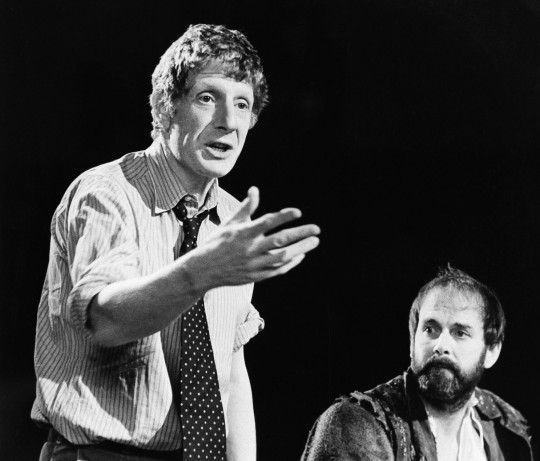
Miller’s first directing assignment was John Osborne’s Under Plain Cover in 1962. Miller made his U.S. directing debut in 1964 with The Old Glory, a play by poet Robert Lowell that inaugurated Off-Broadway’s American Place Theater.
Within a few years, Miller’s work at Nottingham Playhouse and other venues brought him to the attention of Laurence Olivier, then the head of the National Theatre. Miller’s memorable productions at the National, where he was an associate director during the Olivier years, included The Merchant of Venice, set in nineteenth-century Venice with Olivier as a top-hatted Shylock, and The School for Scandal. In 1974, Miller directed a season of three thematically linked plays at London’s Greenwich Theatre, presenting Hamlet, Ghosts and The Seagull as “Family Romances” and using the same actors for each play. Miller later served a two-year term as artistic director of the Old Vic in London (1988–90).
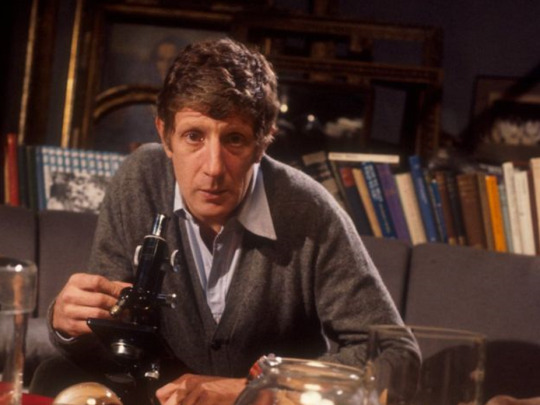
At his best, Miller had no equal for wit, originality or sheer invention as a director, especially in pieces that engaged his passion for storytelling fully; Miller’s universally admired brilliance as a conversationalist made him a coveted talk-show guest in both the U.K. and the U.S.
Miller was also a compelling television writer and presenter, with the documentary series The Body in Question (1979) and Madness (1991) among his credits. When he was in mid-career, Miller began to balance his work in the theater with directing opera—despite the fact that he never learned to read music. Miller’s opera productions were manifestly intelligent and well-informed, but occasionally overbusy, loaded with cultural references and staging touches that did little to advance the action—or support the music.
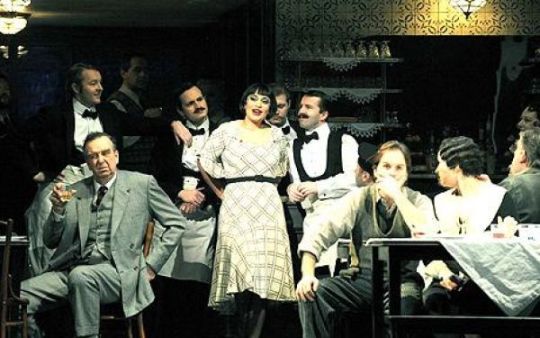
Miller’s first opera production was the 1974 British premiere of Alexander Goehr’s Arden Must Die at Sadler’s Wells Theatre in London; Alan Blyth, writing in Opera, called Miller’s production “severe, and in the end, debilitating.” The Goehr opera was to be one of the few contemporary pieces that Miller directed: in opera, as well as in the theater, he preferred to work on the production of classic works or the occasional rarity. Miller made his Glyndebourne debut in 1975, with the company premiere of Janáček’s Cunning Little Vixen.
He had especially fruitful working relationships with Kent Opera, where he directed a wide variety of repertory, including Così Fan Tutte, Falstaff, La Traviata, Eugene Onegin and Monteverdi’s L'Orfeo.
The British company with which Miller was most closely associated was English National Opera (ENO), which offered a gala celebration of his work with the company in 2016. At ENO, Miller’s vividly detailed stagings included La Bohème, Aida, The Barber of Seville, Carmen, Der Rosenkavalier, La Traviataand The Elixir of Love. Miller’s biggest ENO successes were his popular “Little Italy” staging of Rigoletto (1982) and a re-imagining of The Mikado (1986) that set Gilbert and Sullivan’s Japanese-themed operetta in an English resort hotel; both were presented in the U.S. and have been have been revived in London and elsewhere numerous times. Miller bowed at Covent Garden in 1993, with a modern-dress staging of Così Fan Tutte.
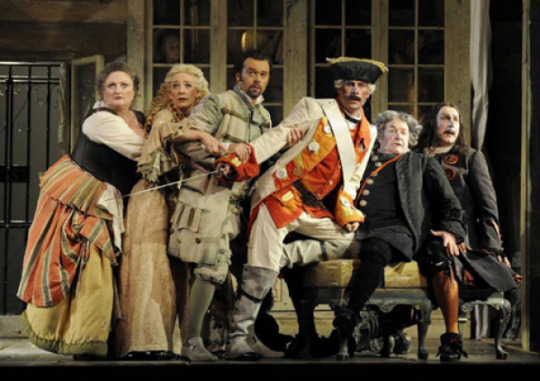
Miller made his U.S. opera debut in 1982, directing Così Fan Tutte for Opera Theatre of Saint Louis. His other North American productions included Bach’s St. Matthew Passion at BAM; La Traviata at Glimmerglass Opera and New York City Opera, Eugene Onegin at Santa Fe Opera, La Bohème at Cincinnati Opera, Così Fan Tutte in Washington, D.C. and Tristan und Isolde in Los Angeles. In Europe, Miller directed La Traviata for Paris Opéra, Der Fliegende Holländer in Frankfurt and a Fascist-era staging of Tosca in Florence. On Broadway, Miller directed Jack Lemmon and Kevin Spacey in Long Day’s Journey Into Night (1986) and Christopher Plummer in King Lear (2004).
Miller directed four operas for the Met. His 1991 staging of Janáček’s Kát’a Kabanová was an unqualified success - a stark, stylized vision of the opera’s harrowing emotional world, designed by Robert Israel and Gil Wechsler. The critical and response to Miller’s other Met stagings—Pelléas et Mélisande (1995), The Rake’s Progress (1997) and Le Nozze di Figaro (1998)—was generally positive, but Miller’s outspoken criticism of what he saw as the Met’s lack of support for him damaged his relationship with the company, and he was never given another new production there.
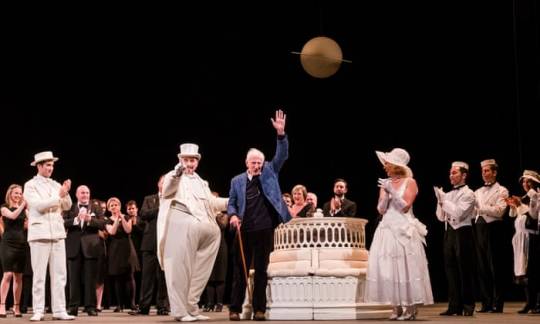
His style of directing especially opera revolved around two maxims, “One is constantly fighting a battle between two forms of idiocy,” he said of the business of opera directing, the first being “mindless traditionalism” and the second the requirement that “the work be relevant to our time”.
As a theatre director, mostly at the National Theatre in London, he sought to avoid those two forms of idiocy when directing Shakespeare, which he did for the BBC in the early 1980s. A production of a Shakespeare play, Miller thought, should not try to preserve it in the aspic of spurious authenticity.
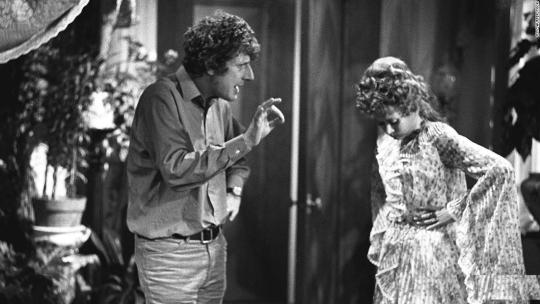
Miller was a lifelong atheist and in 2006 he was appointed president of the Rationalist Association. Accepting the appointment, he said: “There is a large unrepresented constituency of people for whom religion doesn’t enter their heads.” But while his atheism was unbending, it was not militant. Miller maintained that the job of this “community” of unbelievers was not to extirpate religious beliefs but to “analyse them with an objective curiosity and a kind of anthropological attitude to what people do”.
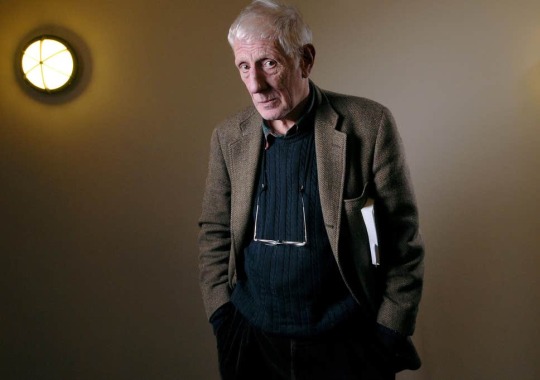
Miller displayed that intellectual humility and profound curiosity in everything he did. Indeed he once said, “I wasn't driven into medicine by a social conscience but by rampant curiosity.“ The same drive he said for his artistic pursuits. Kate Bassett called her informative 2012 biography of Miller In Two Minds, which captured this split in his life. Miller was haunted by his decision to abandon the medical profession where he had hoped to excel.
Ironically Miller rejected the oft-applied title “Renaissance man"as a “vulgar journalistic slogan”. He would argue that, “What they’re really saying is I’m a jack of all trades and a master of none.” He may have felt that “this footling flibbertigibbet world of theatre” was a distraction from higher pursuits - which is to say, the use of his Cambridge medical degree but these twin artistic and scientific interests seemed less opposed than complementary. If, as is said in “The Body in Question,” “by acting in and upon the world we remodel our own image in it,” everybody’s in show business, anyway.
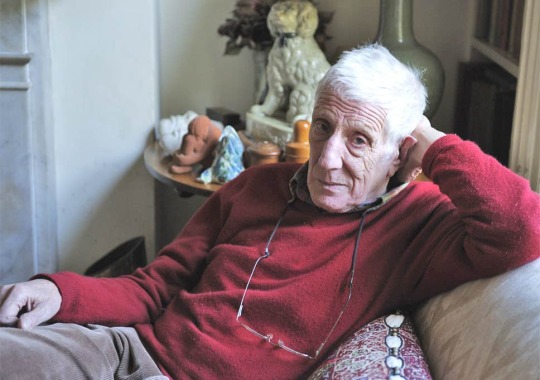
To my mind, Miller’s arts and science background enabled him to cross disciplinary boundaries and make exciting connections and open new creative possibilities. He was the perfect riposte to that very British Two Cultures intellectual debate (1959-62) between F.R. Leavis and C.P. Snow, which focused on the lack of conversation between arts and science. If we consider how scholars now embrace interdisciplinarity, we should note that Miller blazed the trail. Miller should also be viewed as one of the architects of liberal Britain in the post-war period. He rejoiced in being an irreverent free thinker. And we should rejoice at having had the privilege of peeking into the polymorphic proficient mind(s) of one of this century’s creative and most curiousity driven of men.
I had the privilege of having meeting him on one or two occasions. Twice over dinner through my parents who were active patrons of the arts.
One of my older sisters is a neurologist and we were placed either side of him. Jonathan was ever so affable and down to earth. He immediately set about making us laugh with his forensic wit and life observations. Between courses he would flit (not a typo, he didn’t flirt) between my sister and myself. With her he would talk shop about neurology and the latest scientific breakthroughs and with me we talked about opera, theatre, and the classics.
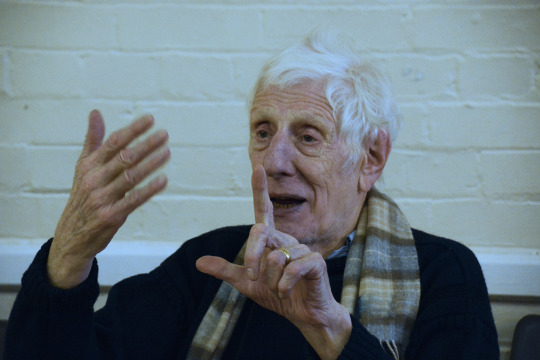
The funny thing was as the evening wore on his kinetic mind was a speeding race car and he suddenly forgot which lane he was driving in i.e. he forgot to whom he was speaking to between the two of us. So he would speak about realism theatre of Euripides with my older sister and neurological disorders with me. My older sister - I hate to admit this in print because she will lorde it over me until the end of days - was educated and eloquent enough to keep the conversation effortlessly flowing.
I would like to say that I too upped my game and rose to such elevated heights of scientific discourse but alas I fell like Icarus...but faster, as my mind felt like lead balloon tied to a one ton dead weight. I fell hard. He could see the tumbleweeds rolling across my vacant mind through my clueless eyes. Ever the gentleman he steered me to more friendly topics like the psychology of killing as I was seriously torn between going Sandhurst to become an army officer or returning to Cambridge to do a PhD. I saw him once or twice after that in other private settings and I always came away glowing because I learned some new curioisity about our human condition and the artistic ways we express the human condition in all its foibles and pathos.
RIP Jonathan Miller.
30 notes
·
View notes
Note
did you hear about martel refusing to go to a screening of a movie directed by polanski? considering she is president of the jury that's amazing
According to Martel her comments were taken out of context and she will be watching the film.
To recap for those not on the up and up: Argentinian director Lucrecia Martel was invited to be the president of the jury for the 2019 Venice Film Festival. Jury members watch all the films in the Official Selection and at the end of the festival they vote and assign prizes only to Official selection films.
As part of her duties to the festival Martel and the other jury members did a press conference before the festival opened and she was asked about convicted child rapist Roman Polanski’s inclusion in the festival (Polanski was convicted of rape in 1977 but has continued to win awards and be embraced by international film communities around the world since then). Martel said she couldn’t separate the artist from the man and that she wouldn’t attend any events celebrating him (there are a lot of galas, dinners, etc that surround a big festival like Venice).
People reported that meant that she wouldn’t watch the film but she issued a statement later clarifying she would watch the film as part of her duties to the festival.
Am I disappointed? Sure. But I’m so angry at the artistic director Alberto Barbera who happily programmed Polanski into competition along with another rapist, actor/director Nate Parker. Also fuck every single producer and investor who gives money so that these rapists can have an artistic voice. The whole thing is revolting and exhausting and I look forward to the day when I no longer have to hear another word from or about these sexual predators.
92 notes
·
View notes